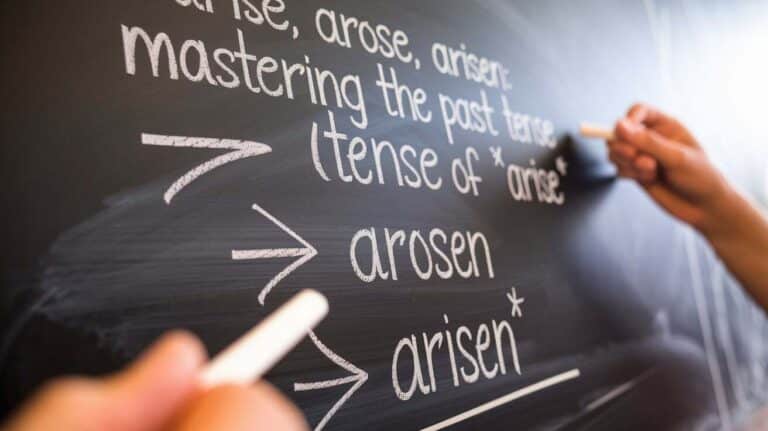Mastering the Past Tense of Meet: Adventure Through English Grammar
Have you ever found yourself tongue-tied when trying to describe a past encounter? You’re not alone. The past tense of meet is a common stumbling block for many English learners and even native speakers. In this comprehensive guide, we’ll embark on a linguistic journey to unravel the mysteries of meet vs met, explore the world of irregular verbs, and perfect our verb conjugation skills. So, let’s dive in and transform your English grammar prowess!
The Evolution of “Meet”: From Old English to Modern Usage
Before we delve into the intricacies of the past tense, let’s take a quick trip through time to understand the roots of this versatile verb.
Read More About : Mastering the Past Tense and Past Participle of “See”: A Comprehensive Guide
Etymology: A Brief History
The word “meet” has its origins in Old English, specifically from the verb “mētan,” meaning to find, find out, or encounter. This ancient root is related to Old Norse “mœta” and Gothic “gamotjan,” all stemming from the Proto-Germanic *motjanan.
“Language is the road map of a culture. It tells you where its people come from and where they are going.” – Rita Mae Brown
As languages evolved, so did the meaning and usage of “meet.” Today, it encompasses a broader range of interactions, from planned encounters to chance discoveries.
Meet Definition: More Than Just a Greeting
In modern English, “meet” has several definitions:
- To come face to face with someone
- To be introduced to someone
- To assemble or gather
- To satisfy a need or requirement
- To encounter or experience
This versatility makes “meet” an essential verb in our daily communication toolkit.
Present Tense: The Many Faces of “Meet”
Before we time-travel to the past, let’s establish a solid foundation with the present tense usage of “meet.”
Meet in Present Tense: Common Applications
Here are some examples of how we use “meet” in everyday situations:
- “I meet my friends at the coffee shop every Saturday.”
- “The board meets quarterly to discuss company strategy.”
- “Our team meets the project deadlines consistently.”
Idiomatic Expressions with “Meet”
English is rich with idiomatic expressions using “meet.” Here are a few to spice up your vocabulary:
- Meet halfway: To compromise
- Meet one’s match: To encounter someone equally skilled or talented
- Meet the eye: To be visible or apparent
- Meet one’s Waterloo: To face a final defeat
Diving into the Past: “Met” – The Time-Traveling Transformation
Now, let’s address the star of our show: the past tense of meet. As an irregular verb, “meet” doesn’t follow the typical -ed ending rule for past tense formation.
Formation of the Simple Past Tense
The simple past tense of “meet” is “met.” This monosyllabic transformation is part of what makes English both fascinating and challenging for learners.
| Present | Simple Past | Past Participle |
|---|---|---|
| Meet | Met | Met |
Pronunciation of Met: Nailing the Sound
The pronunciation of met is relatively straightforward:
- Phonetic spelling: /met/
- It rhymes with “bet,” “let,” and “set”
To perfect your pronunciation, try this tongue twister:
“I met a merry meteorologist measuring melting meteors.”
Common Mistakes and How to Avoid Them
When dealing with irregular verbs like “meet,” learners often make these mistakes:
- Using “meeted” instead of “met”
- Confusing “meet” and “met” in complex tenses
To avoid these pitfalls, practice using “met” in various contexts and tenses regularly.
Beyond Simple Past: Other Past Tense Forms of “Meet”
The simple past isn’t the only way we use “meet” to talk about the past. Let’s explore other verb forms:
Past Participle: “Have Met”
The past participle of “meet” is also “met.” We use it in perfect tenses:
- Present Perfect: “I have met the new manager.”
- Past Perfect: “By the time I arrived, they had met all the candidates.”
Past Continuous: “Was Meeting”
For actions that were ongoing in the past, we use the past continuous:
- “I was meeting with clients when the earthquake struck.”
“Meet” vs. “Met”: A Tale of Two Tenses
Understanding the difference between meet vs met is crucial for clear communication. Let’s compare:
| Meet (Present) | Met (Past) |
|---|---|
| “We meet every Tuesday.” | “We met last Tuesday.” |
| “I hope to meet you soon.” | “I’m glad we met yesterday.” |
| “The rivers meet at this point.” | “The rivers met at that junction.” |
Mastering “Met” in Various Contexts
Formal Situations: Business and Academic Use
In professional settings, precise use of “met” is essential:
- “The team met the project objectives ahead of schedule.”
- “The researchers met to discuss their findings.”
Casual Conversations: Social and Informal Settings
In everyday chat, “met” often describes personal encounters:
- “I met my best friend in college.”
- “Have you met the new neighbors yet?”
Literary Applications: How Authors Use “Met” Effectively
Great writers use “met” to create vivid scenes:
“Gatsby believed in the green light, the orgastic future that year by year recedes before us. It eluded us then, but that’s no matter—tomorrow we will run faster, stretch out our arms farther…. And one fine morning— So we beat on, boats against the current, borne back ceaselessly into the past.” – F. Scott Fitzgerald, The Great Gatsby
Here, Fitzgerald uses “met” metaphorically to describe an encounter with fate and the passage of time.
Synonyms and Alternatives: Expanding Your Vocabulary
To avoid repetition and add flavor to your writing, consider these synonyms of meet and “met”:
Present Tense Synonyms
- Encounter
- Convene
- Assemble
- Rendezvous
- Converge
Past Tense Alternatives
- Encountered
- Convened
- Assembled
- Rendezvoused
- Converged
Common Phrases and Collocations
“Met With” vs. “Met”: Understanding the Difference
- “Met with” often implies a purposeful meeting:
- “The diplomat met with foreign leaders to discuss trade agreements.”
- “Met” alone can describe chance encounters:
- “I met an old friend at the grocery store.”
Idiomatic Expressions Using “Met”
- Met one’s match: Found an equal competitor
- Met with approval: Was accepted or liked
- Met one’s maker: Died (often used humorously)
- Met halfway: Reached a compromise
Practical Exercises: Putting “Met” into Action
Let’s practice with some exercises to reinforce your understanding:
- Fill in the blank with the correct form of “meet”:
- Yesterday, I _ (meet) my cousin at the airport.
- Have you ever _ (meet) a celebrity?
- We _ (meet) regularly to discuss our progress.
- Transform these sentences from present to past tense:
- I meet new people every day at my job.
- The committee meets to approve the budget.
- They are meeting the client for lunch.
- Creative writing prompt:
Write a short paragraph about an unexpected encounter, using “met” and its synonyms creatively.
“Meet” and “Met” in the Digital Age
The concept of meeting has evolved with technology:
- “We met in a virtual chatroom.”
- “The team meets via video conference every week.”
- “I met my partner through an online dating app.”
This digital transformation has expanded our understanding of what it means to “meet” someone.
Conclusion: Mastering “Met” – Your Key to Effective Communication
Congratulations! You’ve now journeyed through the past, present, and even future of “meet” and “met.” By mastering these irregular verbs and their various forms, you’ve added a powerful tool to your English language arsenal.
Remember, language is a living thing, constantly evolving. The more you practice and explore, the more natural and effortless your use of “meet” and “met” will become.
So go forth and meet new challenges, knowing you’ve met the task of understanding this versatile verb head-on. Who knows what fascinating encounters await you in your linguistic adventures?
Word count: 2,513






